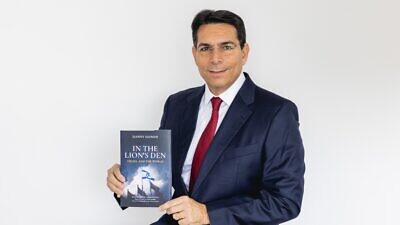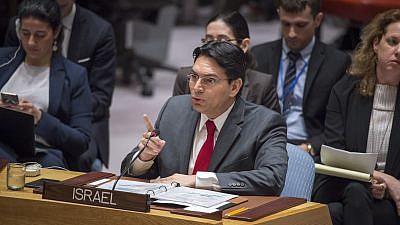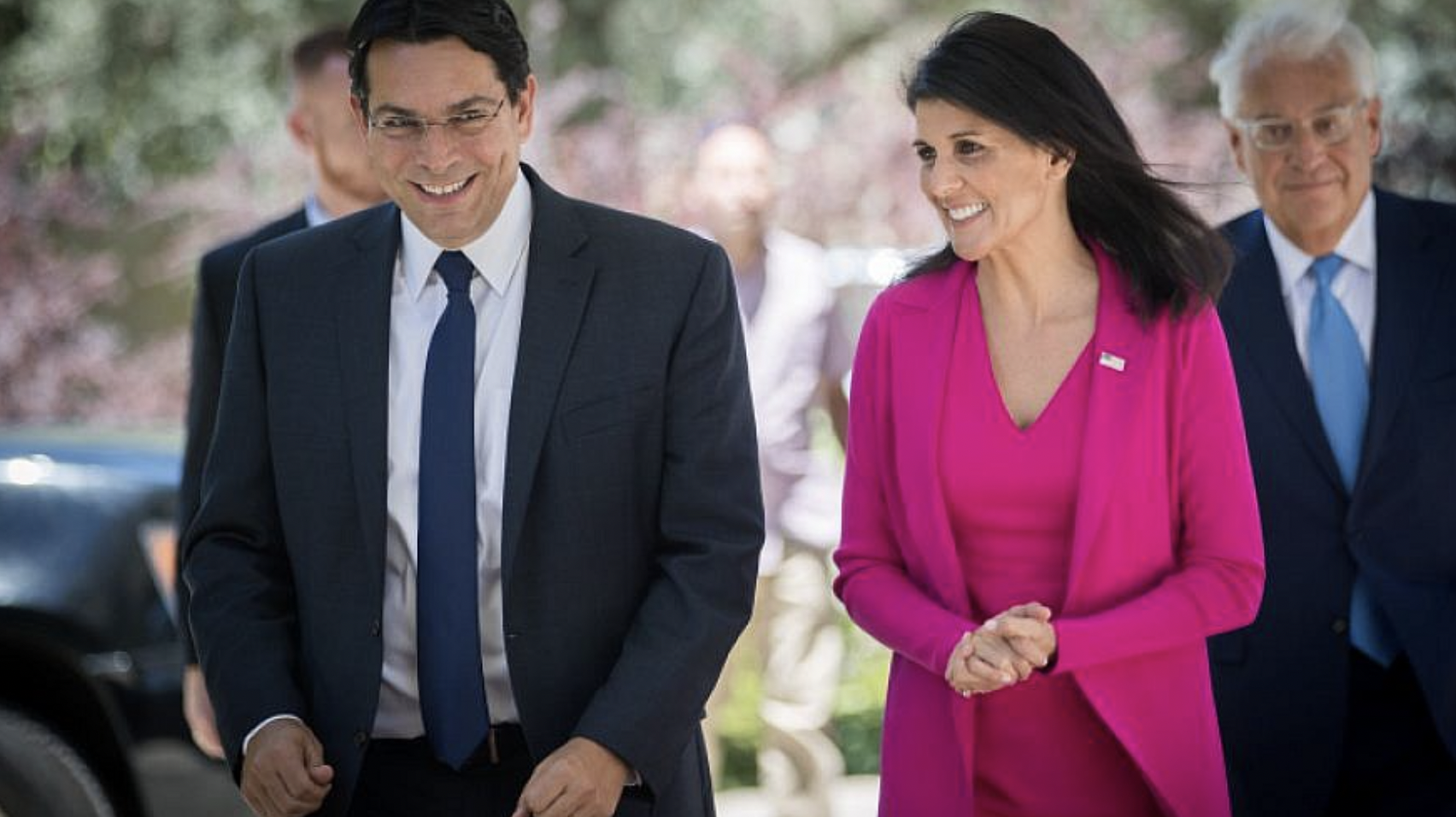World Likud Chairman Danny Danon is a seasoned politician and diplomat, having previously served in the Knesset from 2009 to 2015, including tenures as deputy parliamentary speaker, deputy defense minister and minister of science, technology and space.
In October 2015, then-Prime Minister Benjamin Netanyahu appointed Danon as Israel’s ambassador to the United Nations, a position he held until May 2020.
During his time at the international body, which is widely viewed as downright hostile towards the Jewish state, Danon made history by becoming the first-ever Israeli elected to chair a permanent committee, the U.N. Legal Committee.
His experience at the U.N. dealing with critical topics such as the conflict with the Palestinians, the Iranian nuclear threat, and relations with Israel’s closest and most important ally, the U.S., often catapulted Danon into the international spotlight.
This past August, Danon rode that exposure, grassroots popularity and overall know-how to a 15th-place finish in the Likud primary, ensuring that he will enter the 25th Knesset.
Indeed, Likud is polling at around 32 mandates ahead of the Nov. 1 election, with party chief and opposition leader Netanyahu’s right-wing/religious bloc on the threshold of securing a 61-seat parliamentary majority.
JNS recently spoke with Danon, who outlined his political ambitions and policies on Israel’s most pressing diplomatic, defense and economic matters, and discussed his new book, In the Lion’s Den: Israel and the World.
The interview has been edited for brevity and clarity.
Q: Israel is in full election mode, with its fifth national vote in three years upcoming on Nov. 1. Why do you think the Likud Party is best-suited to lead the Jewish state?
A: I think we have seen in the last year the alternative to the Likud leadership. Unfortunately, we see that there is a lack of experience in this current government. We see it on many fronts. Take, for example, what is happening with Lebanon, the shameful [maritime border] agreement that is being negotiated. Basically, we saw that Prime Minister [Yair] Lapid is surrendering to the demands of Hezbollah. And I think [interested parties in Lebanon] take advantage of the unique position that [Lapid] is inexperienced and has no knowledge on how to handle such complicated negotiations.
This applies to other aspects such as the economy and domestic security as well. You know, today violence is everywhere and I think most Israelis realize that if they want to see a real change, they need to support the Likud and allow us to come back. We haven’t done everything the way we wanted, but I think people actually saw the differences between a Likud-led government and the current [coalition].
Q: What are the issues that will top your agenda when you enter the next Knesset?
A: I will focus on three main issues in the Knesset and hopefully in the government [if Netanyahu is able to form one]. First is the issue of domestic security. Today, Israelis don’t feel safe and we have to change the paradigm. Today, you see Arabs, radical Arab extremists, and they have no fear. The general public fears walking in the streets and I think it should be the opposite. I think the general population should feel safe and the criminals, the radicals, should fear the police. I intend to work hard to empower our security forces, our policemen, give them [a bigger] budget, more authority and support them.
The second issue is the cost of living, which is something I feel personally and I hear the voices of the general public about. We have to take action in terms of cutting regulations, cutting taxes and allowing the economy to push forward. I think it’s crucial for us, and we proved in the past that we are capable of doing it.
And the last thing, I call it national pride. I think we have to be proud of our presence in Israel and raising our flag. In the last year, we saw radical Arabs raising the Palestinian flag in universities, and attacking Israelis waving our flag in the streets of Jerusalem. So, we have to make it clear that this is a Jewish state and people are proud of raising [the Israeli] flag symbolically and practically.

Q: I’m going to shift now to foreign policy. What is your view of U.S. President Joe Biden and his administration? Do you think that Israel’s ties with Washington are as strong as ever?
A: I recently published my book In the Lion’s Den, in which I describe the relationship between Israel and the U.S. and its complexity. You know, I served at the U.N. during the administrations of presidents [Barack] Obama and [Donald] Trump, and I think we have a very strong bond. For us, the main issue is the [2015] Iran [nuclear] deal, what will be the position of the administration regarding it. That is something that we really have to take into consideration and that is something we have to be vocal about.
When I spoke about Lapid, I think this is another example to show that he is not suitable [to be prime minister], that for almost a year he kept quiet about [a possible new] agreement. And only in recent weeks did he publicly attack the deal, which was good but too little, too late. So I think for us, it all depends on whether [Biden] will sign this dangerous agreement or not.
Q: A recent survey by the Israel Democracy Institute found that a majority of Jewish Israelis, 55 percent, in fact, oppose the next Israeli government advancing the two-state solution as a paradigm for solving the conflict with the Palestinians. Previously, you came out on record opposing the two-state solution. Is this your current position?
A: When you listen to Lapid’s speech at the U.N. [General Assembly in September], he said exactly the opposite of what you just mentioned. He said that most Israelis support the two-state solution, which I think today is not on the agenda. We have an election in two weeks and I haven’t seen even one party promoting this idea, including Lapid and [Defense Minister Benny] Gantz, or [the] Labor [Party], even [the far-left] Meretz. So, I think people realize that it is not on the table, as there is no viable partner [on the Palestinian side].
We saw what happened in Gaza where we pulled out in 2005, [with Hamas taking over and thousands of rockets and mortar shells fired at Israel]. The last thing we want to do is create a terror entity in our backyard in Judea and Samaria. So, I don’t think it’s relevant.
I can tell you what my vision is for the future regarding the Palestinians: Israel’s goal should be to try to have maximum security control and minimum [civilian] control of Palestinians in Judea and Samaria. That should be the goal. Now how you do it, that’s part of the negotiations once we have a viable partner and not [P.A. chief Mahmoud Abbas]. But we have no intention of running the Palestinian cities, of running their education system, for example. At the same time, we need to make sure that Jewish communities both within Judea and Samaria and within the Green Line can live in safety.
Q: Let’s focus on Iran for a moment. Absent a nuclear agreement, do you think that the Islamic Republic’s nuclear program can be stopped without Israeli military intervention?
A: Yes, I do. It is still possible if we see strong leadership on the part of the international community. You know, putting crippling sanctions on Iran, using economic leverage. The issue shouldn’t be only Israel’s burden. A nuclear Iran would be a threat not only to Israel and the region but to the entire world. So, I think [stopping this from happening] should be the responsibility of other countries as well. At the same time, we should be ready for the scenario that you mentioned, that there will be no other choice and we will have to take care of the threat ourselves. But in terms of responsibility and feasibility, I expect other countries to be involved.

Q: I’d like to discuss your time at the U.N. What do you view as your biggest achievement during your tenure?
A: I think I was the first to prove that we can win even in a hostile place like the UN. You mentioned the achievement of being elected as the chairman of the Legal Committee. I set a precedent, an important one, and I’m sure in the future you will see Israelis being elected to different positions at the U.N. Basically, I proved that we can close the gap between the “private” U.N. and the “public” U.N. I learned that many countries support our initiatives, but when it comes to the multilateral arena, they tend to forget about our bonds and friendship and vote against us. I pushed them on many occasions and was able to get them to be on our side.
For example, the Legal Committee together with [then-]U.S. Ambassador Nikki Haley, who is a great friend of Israel’s, once put together a resolution condemning Hamas in the General Assembly and got the majority of the vote [in favor]. So, I think it proved that if you come with your initiative and you push your friends and allies you can achieve a lot.
Q: I’ll cycle back to your previous tenure in the Knesset. You served in various senior positions; what do you view as your major accomplishments?
A: I held many positions in the Knesset and I think the connection to the Diaspora is a crucial one. As chair of a committee for immigration and absorption, I was involved in supporting Jews who came to Israel and I think today, as we celebrate the holiday of Sukkot and have so many guests coming from all over the world, both Jews and non-Jews alike coming to Jerusalem for the Feast of the Tabernacles, we should be doing more to support those who make aliyah—and that’s what I did in every position I held.
When I was in the Defense Ministry, I [implemented programs for] Lone Soldiers in the IDF that we didn’t have in the past. In the Knesset, I passed legislation supporting Ethiopian Jews and Jews from other countries, [for whom] it is very hard to convert their diplomas from universities abroad. In Israel, I think it’s important not only to bring more olim, but to make sure they adjust and stay.
Q: Finally, what is the most important message that you wish to convey to Israelis and the Jewish people ahead of the Nov. 1 national vote?
A: I think many people, and I speak with many leaders around the world, are skeptical about our [political] system, but we have to be proud of it. It’s not perfect and today we are in limbo, with a parliamentary crisis [that has resulted in four previous elections in the past 3 and a half years].
But we should still be proud of our democracy. Having spent so many years at the U.N., I met so many leaders and it’s very hard to find real democracies today. Look at the map and ask yourself, where else you can see a strong democracy like we have here in Israel? It’s rare. You can find a few dozen nations around that are strong democracies, and the fact that we are one, in which people go to the ballot box to choose their leaders, it’s meaningful and we should be very proud. I think there will be a clear decision [in Nov.], and Likud will [garner] enough votes to put together a strong [coalition] and govern for years.























